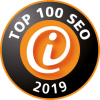Search engine optimization is one of those high-priority tasks that require regular maintenance. If you want your website to have good visibility on search engines, you have to stay up-to-date on the requirements imposed by search engines. Those with high search engine rankings can count on more visitors to their website and thus more potential new customers, since only 1% of users click through to the next pages in the search results. This means that 99% of search engine users remain on the first page fo SERPs, according to eCommerce Magazine. In this post, we will explain the requirements you need to keep up with for an efficient search engine optimization campaign.
How important efficient search engine optimization actually is can be seen in the following numbers: the search engine Google owns 86% of the market share in the USA in 2020 and had 1.74 billion websites on their platform around the world in January 2020. All the implemented requirements and evaluation criteria are a way to avoid becoming invisible to visitors among the billions of websites out there. The number of rating criteria is currently over 200, and more are added regularly. These are split into three types, all of which are crucial for good SEO: strategic, technical, and on-page. Search engine optimization is also a process that is never “done”. It requires regular maintenance and servicing.
However, by planning your own website, you will save yourself quite a bit of work. During preliminary planning, the prerequisites for these different SEO types are listed so that a website owner can gain an overview of them. The company’s own goal should be kept first and foremost. Based on the questions answered, KPIs can be calculated, which can provide more detailed data on the success of applied techniques.
The correct use of keywords should also not be underestimated. In contrast to a few years ago, it is no longer necessary to put keywords as often as possible on your website. It is enough if the relevant keywords are in the headlines or in the URL. For this purpose, relevant keywords should be carefully selected beforehand and compared with those of competing companies.
Next, the choice of hardware plays an important role. Hardware also affects performance, which is responsible for the loading speed of the website. Slow-loading pages are crawled less often, and a low page speed also affects users’ behavior. If the loading speed is too low, users usually leave the website after a few seconds. This has a negative effect on the relevance of the website, and this is then also relayed to search engines. In addition, the CMS also affects load speed. Therefore, your CMS solution should be lean, flexible, and responsive, i.e. provide a good user experience for the most common device types (desktop, tablet, smartphone).
Last but not least, we now address the role of content as the third pillar of SEO. The content should always be user-oriented and offer visitors value. Good content has a decisive effect on the length of stay, the bounce rate, and the scroll depth of site visitors. The URL itself should provide clues about the subject matter of the content. In addition to relevant content, the website should be clearly structured. Headline hierarchies should thus be stuck to, bullet points used, and the page generally kept reader-friendly. Multimedia can also add value to the website and increase the time visitors spend on your page. Content can also be offered as a PDF download so that users can revisit certain topics later on.
SEO is a never-ending process; website owners must constantly keep up with ever-changing requirements. Regular search engine relaunches constantly change the ranking criteria, requiring companies to accept and adapt to this fact. However, those who find dealing with SEO in addition to their company’s own tasks to be too much do need not feel lost – companies such as effektor.de offer support for business owners’ SEO work.












